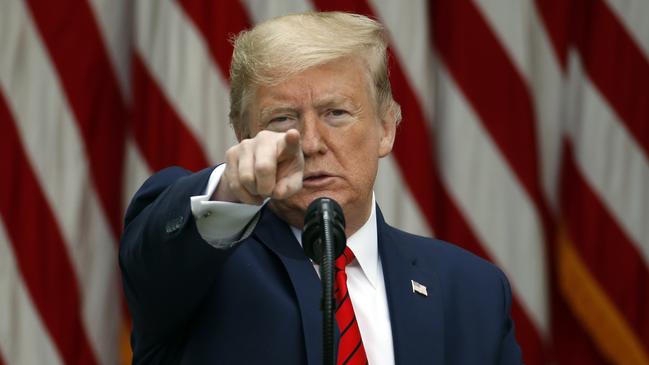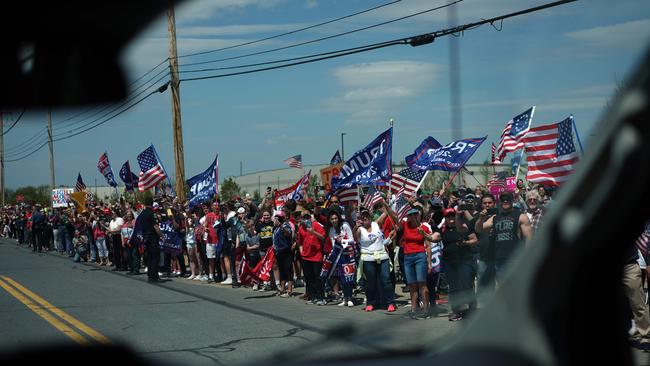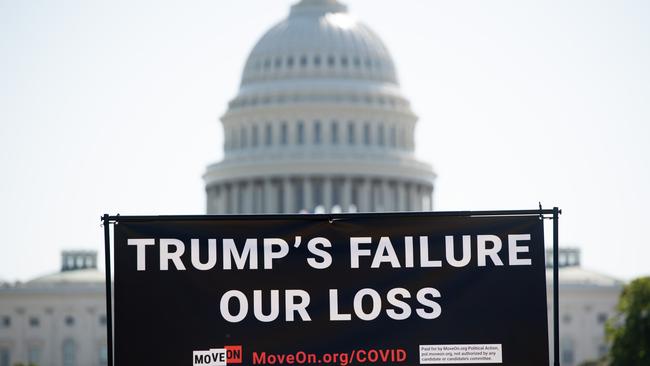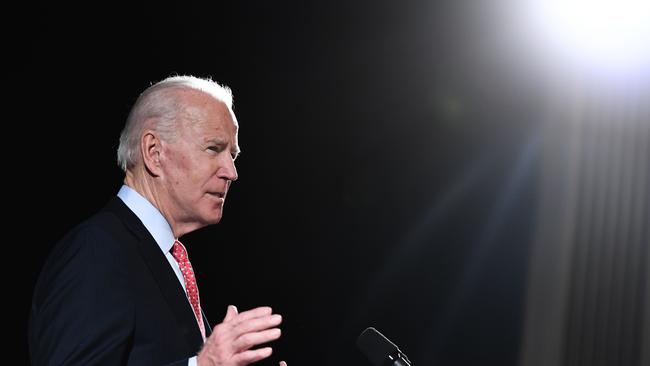Coronavirus: Trump faces his most dangerous test
A new trajectory is set — but will it trigger a second wave of death that destroys Trump’s chances?

“In every generation, through every challenge and hardship and danger, America has risen to the task,” Donald Trump said on the lawns of the White House this week. “We have met the moment and we have prevailed.”
When asked whether he was suggesting the US had prevailed over the coronavirus that had killed more than 85,000 Americans and crushed the world’s largest economy, Trump retreated to say he was talking about prevailing over testing for the virus.
But the moment highlights the growing disparity between Trump’s salesmanship about what’s happening in the US right now and the reality on the ground.
During the past week the President has claimed variously that the coronavirus will “go away without a vaccine”, that “anybody who wants a test can get a test” and that “the numbers (of virus cases and deaths) are coming down very rapidly all throughout the country”.

Each statement was demonstrably false even as Trump claimed the US was experiencing a “transition to greatness” as the country took baby steps towards reopening its freefalling economy. But with less than six months to go before the US presidential election, Trump’s natural penchant for boosterism is being turbocharged by the fact he is fighting for his political life.
Trump must win his second term in office in the face of the rampaging virus, the worst economic collapse since the Great Depression and a nation unhappy with his handling of the pandemic and increasingly divided about how and when to resume normal life.
“If the economy continues to crater, I think that presents serious problems for the President,” Michael McAdams, spokesman for the National Republican Congressional Committee, said this week.
Republican polling has found that the greatest political threat to Trump is not the death count from the pandemic, as forbidding as that is, but the economic carnage that has left 36.5 million Americans out of work.
New internal polling by the Trump campaign in key election battleground states shows two trends that have given Republicans hope.
The first is that polls show people trust Trump more than Democrat presidential rival Joe Biden — by 15 points — to rebuild the shattered economy. This “I built it once so can build it again” message is likely to be Trump’s key campaign mantra.
The second trend that has encouraged the White House is that a growing number of voters — albeit still a minority — now believe it is time to reopen the economy.
Since the pandemic began to wash over the US in February, Trump’s gut instinct has been to prioritise the economy over fighting the virus — a priority at odds with the scientists on his coronavirus taskforce and majority public opinion.
From his initial hopes of reopening the US by Easter to his “liberate” tweets last month Trump has egged on state governors to reopen even if it means flouting the White House’s own guidelines for doing it safely.
He has done so in the face of polls that consistently show most Americans still fear the virus more than the collapsed economy and ongoing warnings from his own scientists — amplified in Senate hearings this week — that reopening the country too fast could trigger a catastrophic second wave of deaths.
But after two months of economic and social shutdown, the mood of a restless and financially stricken nation is slowly changing in Trump’s favour.
Despite stubbornly high infection and death rates from the virus, 48 of the 50 US states have taken, or soon will take, tentative steps to reopen some parts of their economy. At least half of these states are doing so without meeting the key safety guideline recommended by the White House of 14 days of downward trajectory in new coronavirus cases.
While this horrifies health experts and most Democrats, polls suggest that a growing number of Republican voters agree with Trump that the economy must now be prioritised over lives.
A Politico/Morning Consult poll this week found the percentage of Republicans who said it was more important to address the virus than the economy plunged from a month earlier, from 65 per cent to 43 per cent. In other words, only two in five Republicans now say the virus is more frightening than the shuttered economy.

“As congress reconvenes, a sharp political divide continues as Republicans are increasingly more concerned with the pandemic’s economic impact, though a plurality of voters feel the country is reopening too quickly,” Morning Consult vice-president Tyler Sinclair says.
Despite the shift in Republican sentiment, the poll found voters still believed, two to one, that it was more important for the government to tackle the virus than the economy, with almost three-quarters of Democrats taking this view. But Trump has been encouraged by the trends within his supporter base and is moving to politicise the issue of reopening the economy.
Ahead of his visit to the key swing state of Pennsylvania on Friday, Trump took a shot at the state’s Democratic governor and all Democrats, accusing them of trying to hurt him politically by refusing to reopen quickly.
“The great people of Pennsylvania want their freedom now, and they are fully aware of what that entails,” Trump tweeted. “The Democrats are moving slowly, all over the USA, for political purposes. They would wait until November 3rd if it were up to them. Don’t play politics. Be safe, move quickly!”
Biden says Trump is using a well-worn playbook in trying to divide the US along political lines over the pandemic: “President Trump is reverting to a familiar strategy of defecting blame and dividing Americans. His goal is as obvious as it is craven: he hopes to split the country into duelling camps, casting Democrats as doomsayers hoping to keep Americans grounded and Republicans as freedom fighters trying to liberate the economy.
“It’s a childish tactic and a false choice that none of us should fall for. The truth is that everyone wants America to reopen as soon as possible — claiming otherwise is completely absurd.”
But Trump’s push to cast the reopening of the US economy as a partisan debate is fraught with political risk. Polls show most Americans are unhappy with his handling of the pandemic, with a Washington Post-Ipsos poll this week finding 56 per cent disapprove while 43 per cent approve.
Trump was widely criticised early on for his initial dismissal of the virus as a threat and for his inaction during the crucial period from mid-February to mid-March when the virus spread unchecked from coast to coast. Since then he has been attacked for his refusal to oversee a consistent and large-scale federal response to the virus, leaving it up to the states to implement a patchwork response, often without adequate supplies.
Ironically, many of those state governors who have had to manage the pandemic with minimal support from Trump are enjoying record approval ratings, sparking jealousy from the President.
“Remember this, every Governor who has sky high approval on their handling of the Coronavirus, and I am happy for them all, could in no way have gotten those numbers, or had that success, without me and the Federal Governments help. From Ventilators to Testing, we made it happen!” Trump tweeted.
Now he is finding that his leadership failures during the pandemic threaten his hopes of the economic revival that might give him a fighting chance at victory in November. Trump’s refusal to mandate an early and widespread federal program of testing is coming back to haunt him because it is stopping Americans from embracing his call to return to work and play.
“You don’t know what the virus is doing unless you are testing,” says Andrew Cuomo, governor of the hardest hit state, New York.
Trump repeatedly has downplayed the importance of testing while exaggerating its availability. He has described the importance of testing as “overrated” and says widespread testing only inflates the number of confirmed cases and so “by doing all of these tests, we make ourselves look bad”.
This week Trump bowed to mounting pressure to boost testing across the country only after being persuaded by his scientific advisers that a lack of testing could impede his hopes of reopening the economy.
According to the COVID Tracking Project the US has tested only 2.74 per cent of its population, less than Italy, Germany, Canada and many other nations, despite having easily the largest death toll.
“It’s the ability and the capability of responding to those (virus) cases with good identification, isolation and contact tracing (that) will determine whether you can continue to go forward as you try to reopen America,” Trump’s top infectious disease expert, Anthony Fauci, says.
Trump has moved to substantially increase tests across the country with an $US11bn ($17bn) injection of funds, but this will come too late for many returning to work. The US is testing about 400,000 people a day, well short of the Harvard University’s Global Health Institute estimate of a minimum of 900,000 tests a day, while other research models say several million tests are required in the US each day as the economy starts to reopen.
Much of the debate about restarting the US economy has been framed in binary terms as a choice between tackling the virus or reopening the economy.
In his Senate testimony this week Fauci said one was impossible without the other. He warned that if the economy were reopened too quickly then it would trigger a potentially disastrous second wave of the virus that would then undermine the economic revival that caused it.
“There is a real risk that you will trigger an outbreak that you may not be able to control, which in fact, paradoxically, will set you back, not only leading to some suffering and death that could be avoided but could even set you back on the road to try to get economic recovery,” he said.

The key question for those US states that are beginning to reopen their economies is whether enough people will venture from their homes to join in.
Unlike Australia, the US is reopening as the coronavirus continues to kill more than 1500 people a day, with 28 states yet to experience a decline in infections.
It is all very well for states to reopen businesses but it is no guarantee that people will frequent them if they feel the risk is too high. Georgia Governor Brian Kemp opened his state’s dine-in restaurants on April 27, but data from restaurant booking service OpenTable showed 92 per cent fewer diners on that day than a year earlier.
Many small businesses across the country have reported only modest demand since reopening, suggesting that many people are too scared to resume normal life while the virus remains rampant.
Says Biden: “States and cities that have attempted to reopen are discovering the economy isn’t a light switch you can simply flip on — people need confidence to make it run and that confidence must be earned by credible leadership and demonstrable safety.”
Even so, America’s new trajectory is now set. The virus has not been subdued yet the economic pain is such that businesses are reopening. Some Americans will embrace this while others will stay home until the virus is subdued.
Will this be enough to produce the sort of economic bounce that Trump is relying on to defeat Biden in November? Or will it trigger a second wave of death that destroys Trump’s chances and plunges a troubled America into an even darker place?
The stakes could hardly be higher as this US election campaign begins.
Cameron Stewart is also US contributor for Sky News Australia.


To join the conversation, please log in. Don't have an account? Register
Join the conversation, you are commenting as Logout